BMW E30 Alignment
Simply changing the way the wheels are aligned to the centerline of the car and to the road is one of the easiest and cheapest ways to get better handling from any car. This goes double for the E30, because of the way lowering affects alignment. Dual-purpose cars can benefit most from adjustable suspension parts, because you can use one setting for street driving and another for track or autocross course.
Toe is the only adjustable setting at the front. A little front toe-in (less than 1/8 inch) helps counteract the natural tendency of the front tires to spread out as you drive down the road. The ideal amount varies depending on the size of your tires, the amount your car has been lowered, and the kind of driving you do.
With more toe-in, the car tends to follow a straight line; the less toe-in, the more it tends to dart from side to side. Rear toe should always be slightly in, with the exception of cars that are driven only on the autocross course or used for judged drifting events. Toe-out at the rear makes for a tendency to snap oversteer, which gets worse with increasing speed.
Caster is another setting that can be changed to improve handling. BMW knows this too; the E30 M3 (as well as early E36 M3) was shipped with special offset control arm bushings (PN 31-12-9-064-875) that move the rear control arm pivots out, increasing caster. However, the bushings don’t do anything about camber and they do not add adjustment.
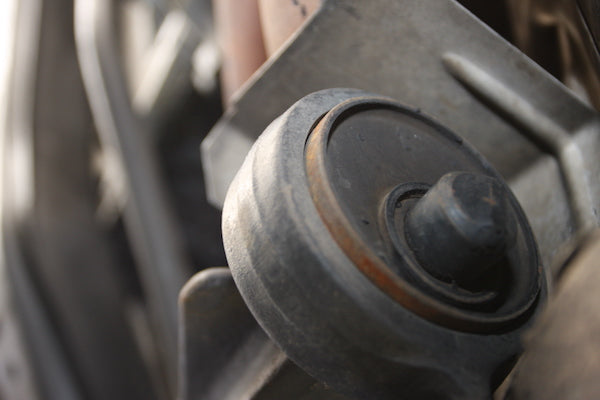
The M3’s offset front control arm bushings are an easy upgrade to the regular E30, giving you increased caster and a stiffer rear bushing.
This Tech Tip is From the Full Book, BMW 3-SERIES (E30) PERFORMANCE GUIDE 1982-1994. For a comprehensive guide on this entire subject you can visit this link:
LEARN MORE ABOUT THIS BOOK HERE
SHARE THIS ARTICLE: Please feel free to share this post on Facebook Groups or Forums/Blogs you read.
You can use the social sharing buttons to the left, or copy and paste the website link:
https://www.cartechbooks.com/blogs/techtips/bmw-e30-alignment
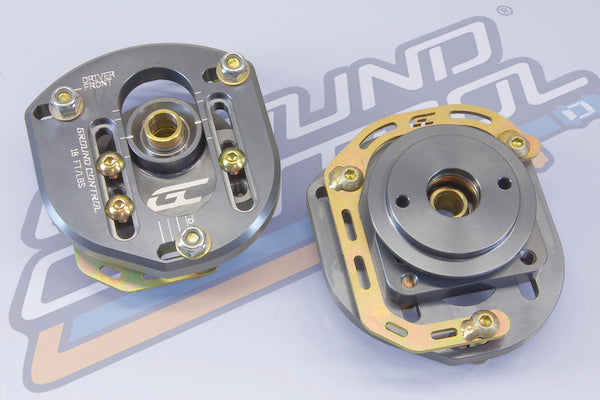
The best solution for front-wheel alignment (especially for a track car) is a caster-camber adjuster plate (or just “camber” plate). This replaces the factory rubber/steel front upper strut mounting with a slotted-aluminum plate and a set of steel bearings. The slots allow you to move the top of the strut in and out to adjust camber, and forward and back to adjust caster. (Photo Courtesy Ground Control Suspension Systems)

These plates are a little different than race plates. They have a steel roller bearing mounted in urethane for noise isolation on the street. In either case the adjustment process is quick and easy since it is made from above in the engine compartment. (Photo Courtesy Ground Control Suspension Systems)
Aftermarket front strut mounts have another benefit besides simpler adjustability. They are shorter because there is no rubber bushing between the body and the strut shaft. There is simply a spherical bearing that sits up higher in the mount. This increases suspension travel since the shaft is pulled out more at rest and the bump stop is moved upward, relative to the body and upper spring mount.
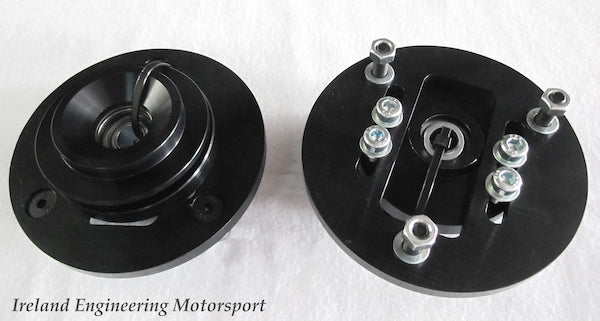
Here’s another type of E30 camber plate made by Ireland Engineering. (Photo Courtesy Ireland Engineering)
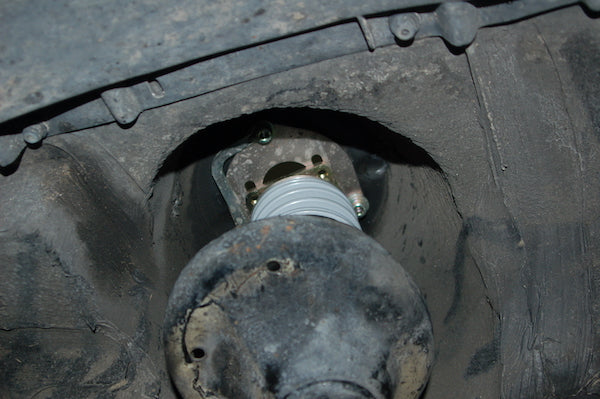
This underside view clearly shows how the top of the strut can be moved with an adjustable strut mount. (Photo Courtesy Vorshlag Motorsports)
If you want to maintain the rubber mounting at the top of the front struts for noise reasons on a street car, BMW makes an offset front mount (PN 31-33-1-139-484) that adds (or subtracts!) 1/2 degree of camber. These are also a good solution for a race car in one of the stock or limited-modifications series that requires rubber bushings or non-adjustable upper mounts.
In the rear, unfortunately, it’s not as easy to make the suspension adjustable. The easiest way to change the rear camber is with offset bushings. Several aftermarket vendors make them; some of them (such as those from Bavarian Autosport) are adjustable with the control arms installed in the car. Again, BMW knew this is an issue and provides very nice rubber offset trailing arm bushings (PN 33-32-9-058-822). The BMW bushings are not adjustable, so you have to make a decision on toe and camber changes before installing them. A good alignment shop can put your car on the rack and figure out which way to install them fairly easily.
The best solution for rear wheel alignment is to slot the factory pivot points and install eccentric bolts. This requires that you remove the rear subframe and either modify it yourself or have someone else do it.
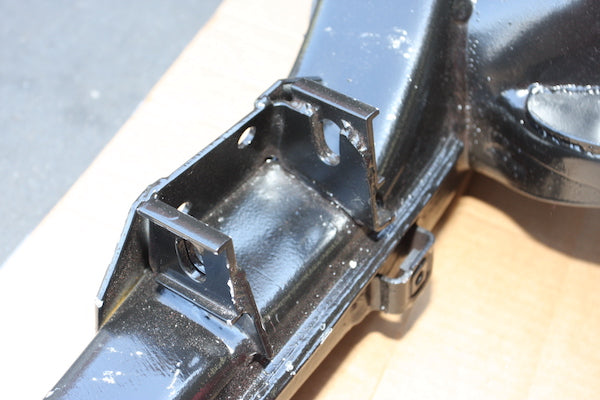
Eccentric trailing-arm mounting bolts are not too hard to install by a competent welder. Both pivot points should be slotted, then camber and toe can be independently adjusted. On this setup the inner pivot is slotted for camber and the outer, for toe.
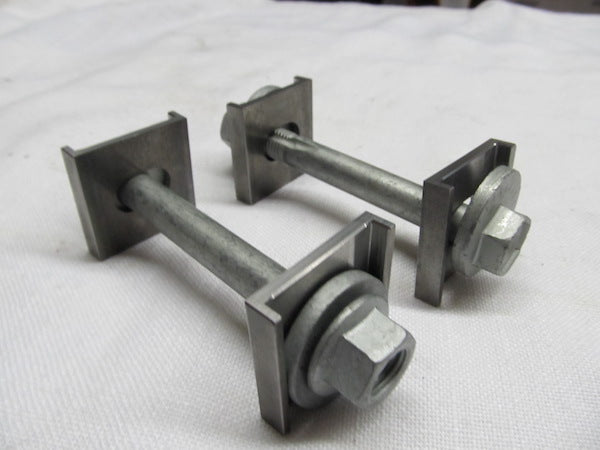
This Ireland Engineering setup uses factory 5-series eccentric bolts with special shoulders that must be welded to the control arm mounting points. (Photo Courtesy Ireland Engineering)
As for alignment specifications, when you take the car to get aligned you need to give the technician some baseline numbers. Factory numbers are not particularly useful because the ideal alignment for a particular car depends on how it is driven, what modifications have been made to it, what tires it has, and how the driver likes the car to feel.
You may need to have your car aligned a few times to hone in on the feel you are after.
Written by Robert Bowen, from the book BMW 3-SERIES (E30) Performance guide 1982-1994


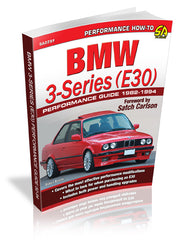
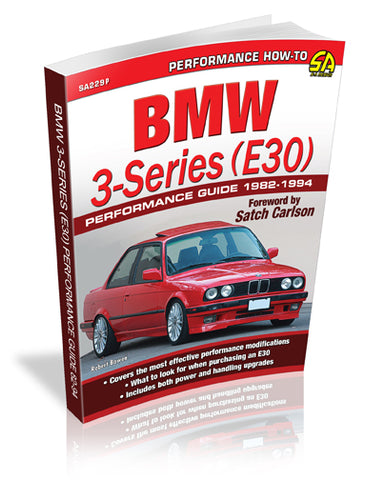 LEARN MORE ABOUT THIS BOOK!
LEARN MORE ABOUT THIS BOOK!